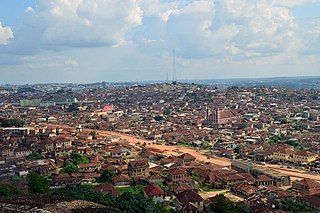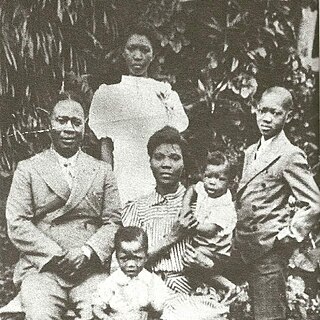
Ogun State is a state in southwestern Nigeria. As a Nigerian state, Ogun is the second most industrialised state after Lagos, with a focus on metal processing. It has good road and rail connections to the harbours in Lagos and Lekki. Wole Soyinka, winner of the Nobel Prize for Literature 1986, lives in Ogun.

The Ransome-Kuti family is a Nigerian Yoruba political family noted for its simultaneous contributions to art, religion, education and medicine. It belongs to the Nigerian bourgeoisie, and also has historic links to the Nigerian chieftaincy system.

Abeokuta is the capital city of Ogun State in southwest Nigeria. It is situated on the east bank of the Ogun River, near a group of rocky outcrops in a wooded savanna; 77 kilometres (48 mi) north of Lagos by railway, or 130 kilometres (81 mi) by water. As of 2006, Abeokuta and the surrounding area had a population of 449,088.
Egba Ake, otherwise known as Egba Alake, is one of the four sections of Egbaland, the others being Oke-Ona, Gbagura, and the Owu.

Adedotun Aremu Gbadebo III is the current Alake of Egba, a clan in Abeokuta, Nigeria. He has ruled since 2 August 2005.
Ago-Oba is electoral ward 13 in the city of Abeokuta, Ogun State, Nigeria. It is part of the Abeokuta South Local Government Area.
The Abeokuta Women's Revolt was a resistance movement led by the Abeokuta Women's Union (AWU) in the late 1940s against the imposition of unfair taxation by the Nigerian colonial government. The women of Abeokuta believed that, under colonialism, their economic roles were declining, while their taxes were increasing. Additionally, they argued that until they were granted representation in local government, they should not be required to pay taxes separately from men. As a result of their protests, four women received seats on the local council, and the taxation of women was ended.

The Alake of Egbaland is the paramount Yoruba king of the Egba, a clan in Abeokuta, Ogun State, southwestern Nigeria. Egba consists of Egba Ake, Owu kingdom, Oke-Ona and Egba Gbagura.

Israel Oludotun Ransome-Kuti was a Nigerian clergyman and educationist.
Josiah Jesse "J.J." Ransome-Kuti was a Nigerian clergyman and music composer. He was known for setting Christian hymns to indigenous music, and for writing Christian hymns in Yoruba.
Eso Ikoyi is an aristocratic attribute amongst the Yoruba people which denotes an eminent warrior. It has been used as everything from a chieftaincy title to a part of praise poetry.

Oba Sir Ladapo Samuel Ademola KBE, CMG (1872–1962), also known as Ademola II, was the Alake of Abeokuta from 1920 to 1962. Before he was crowned Alake, Ademola was involved in the affairs of the Egba United Government. As a member of the Egba council, he was a leading participant in negotiations with the Lagos State colonial government in 1889 for the rights to construct railway tracks passing through Egbaland. In 1904 he travelled with Alake Gbadebo to the U.K., where they were received by King Edward VII. He succeeded Oba Gbadebo in 1920 with overwhelming votes from the Egba council.

Abeokuta Grammar School is a secondary school in the city of Abeokuta, Ogun State, Nigeria. It is currently located at Idi-Aba area, of Abeokuta. Often called the first grammar school in Nigeria, it is attended by students from all parts of Nigeria, the West Coast of Africa, South Africa, Europe and even Asia.
Iju also known as Iju Oloko [idʒou ɔ:lɔkɔ], is a Nigerian town located in southern Ogun state and about 18 kilometers from Lagos state, a major commercial hub in West Africa. The town is inhabited mostly by Owu and Egba natives whose ancestors settled there between 1842 and 1845.
Samuel Adesina Gbadebo, otherwise known as Gbadebo II, was a Nigerian traditional monarch who held the title of Alake of Egbaland. Prior to becoming Alake, Gbadebo organized agricultural shows in the Western region of Nigeria.
Wasinmi or Wasimi is an Egba town located on the Lagos-Abeokuta Expressway in Ewekoro local government of Ogun State. It is a few miles from Abeokuta. It is home to one of the oldest churches in the area, St. Michael's Anglican Church, and home to Odegbami International College and Sports Academy.
Egba Gbagura is one of the five sections of Egbaland, the others being Ake, Oke-Ona, the Owu and Ibara. It is a traditional state which joins with its bordering sections to form something of a high kingship.

Chief Isaac Oluwole Delano was a Yoruba and Nigerian writer, educationist, political activist, nationalist, radio broadcaster, teacher, and a pioneering linguist and lexicographer of the Yoruba language.
Okukenu Sagbua was a Yoruba Egba chief. He was a founding member of the Ogboni of Egbaland, and also served as the first Alake of Egbaland.







